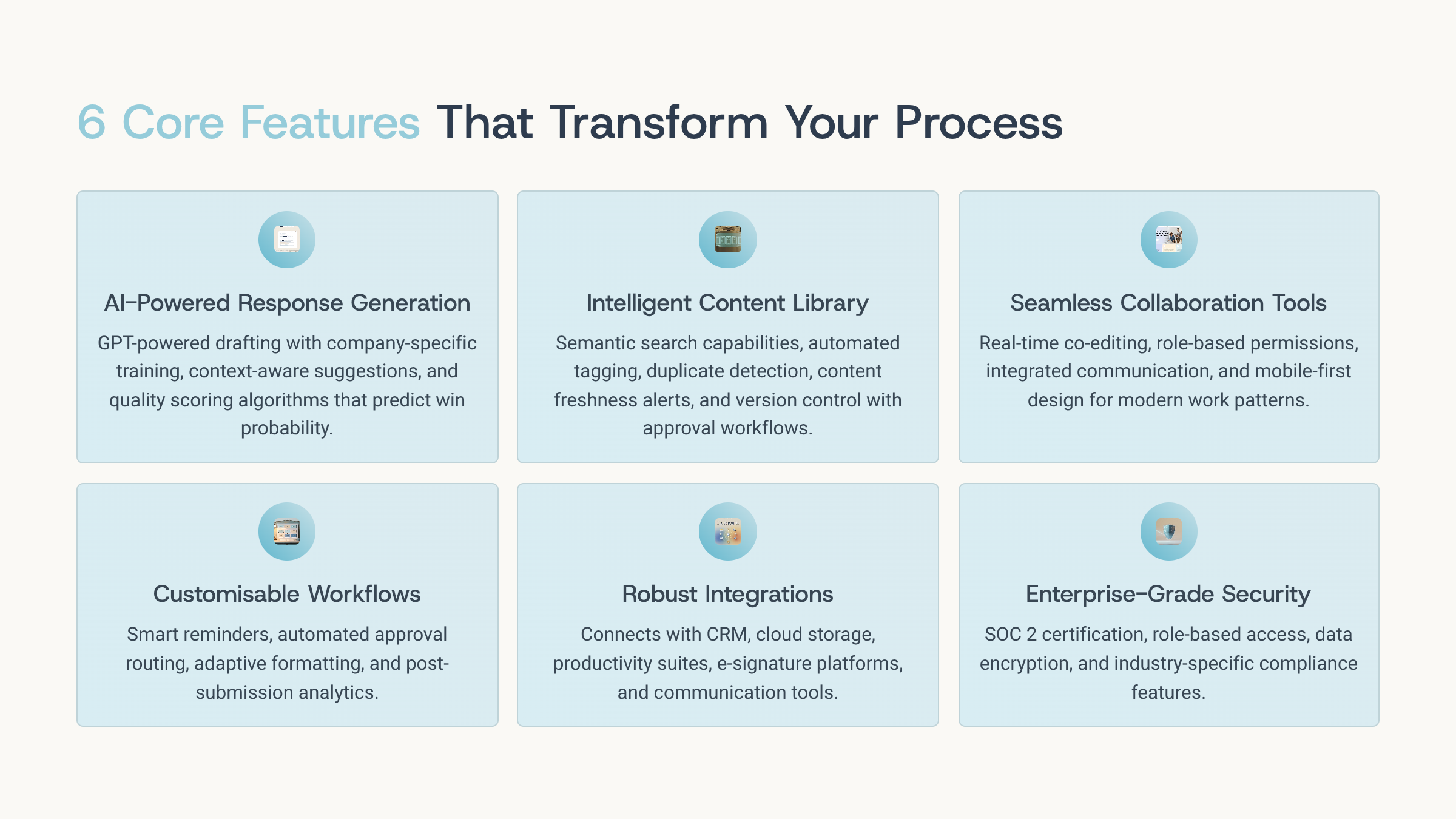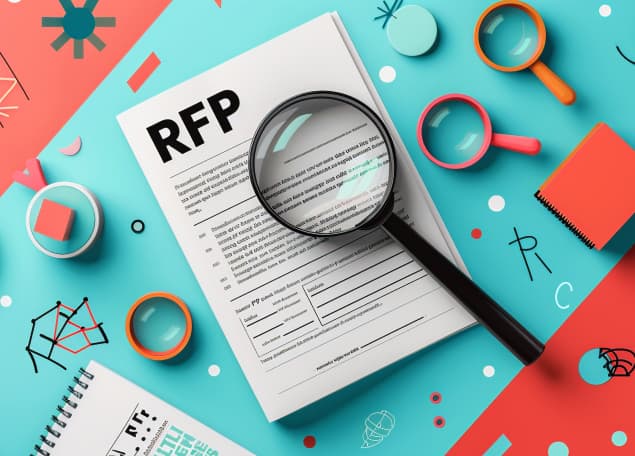RFP Response Software: The Secret Weapon Your Competitors Hope You Never Find
Article written by
Kate Williams

INSIDE THE ARTICLE
SHARE THIS ARTICLE
Summary
RFP response software is changing how businesses win deals. What was once a slow, manual, and frustrating process is now faster, smarter, and more consistent thanks to AI and automation. In this blog, we’ll break down how the traditional RFP process compares to the modern approach, what these platforms actually do behind the scenes, and why adopting them can give your team a real competitive edge.
What could be one of the best investments for your sales teams? A seamless Request for Proposal (RFP) response tool that will take away the hassles, simplify their jobs, and give them their valuable time to ace every deal that comes their way. And when your team does well it creates a ripple effect, automatically building customer value, boosting revenue, and creating impact at every stage of the process. Then why wouldn’t you use a rfp response tool, right? Either you are not aware or you’re still confused which tool will best suit your team. So, here is a complete ‘what-all-should-you-know’ before hopping onto your automated rfp journey.
The Not-So-Hidden Revolution in Proposal Management
RFP response software is shaking up the game in sales and business development. What used to be a dreaded, weeks-long grind of chasing down answers, copy-pasting from old files, and scrambling against deadlines is now a smooth, AI-powered hassle-free process.
The smartest companies aren’t just saving time with these platforms, they’re winning more deals than they ever imagined they would. Modern platforms auto-generate up to 85–97% of a proposal, cut turnaround from weeks to hours, and deliver polished, compliant submissions that make competitors look outdated.
Do you want to know how different the new rfp process is when compared to the old one? Check this out.
The Old Way vs. The New Reality
Most organizations are still stuck in the traditional proposal process: endless email chains, manual copy-paste, and last-minute scrambles that burn out teams. By contrast, companies embracing modern proposal automation are rewriting the rules.
Traditional RFP Process (What Many Still Do):
- 2–4 weeks average response time
- Teams digging through email and past proposals
- Manual copy-paste with high risk of errors
- Version control issues and duplicate content
- Inconsistent messaging and branding
- Burnt-out staff avoiding RFP opportunities
Modern Automated RFP Process (Your Competitive Advantage):
- 2–4 days average response time (up to 97% faster)
- AI-powered content generation and autofill
- Centralized content library with compliance built in
- Real-time collaboration across departments
- Automated quality checks and compliance validation
- Consistent, professional proposals every time
- Teams pursuing more opportunities with confidence
.png)
Want to experience hassle-free proposal management?
Is RFP Automation Better than Traditional RFP Process?
Here’s the truth: the companies that adopt AI-driven proposal management softwares are quietly stacking the odds in their favor. They’re able to respond to more opportunities, with more consistency, and at higher quality than teams still stuck in manual workflows.
In a crowded market, proposal automation is more than a productivity tool—it’s a strategic weapon. It’s what separates companies that just keep up from those that consistently win more deals.
But, what exactly does RFP response tools actually do? Let’s see in detail.
What RFP Response Software Actually Does
Think of AI-powered RFP management software as a Swiss Army knife for your proposal team. It blends automation, collaboration, content management, compliance, and analytics into one centralized platform designed to save time and improve win rates. Here is exactly what the RFP tools does:
Automation & AI
Modern platforms use AI to handle repetitive tasks, freeing up teams to focus on strategy and storytelling:
- Autofill responses from your content library within minutes
- Generate tailored answers based on context and requirements
- Auto-format documents to client specifications
- Score response quality and suggest improvements
- Instantly translate content into multiple languages
Centralized Content Library
RFP content management softwares becomes a single source of truth that eliminates version control headaches and ensures compliance:
- Intelligent search for pre-approved, up-to-date answers
- Automatic version management across teams
- Compliance-ready templates and content
- Duplicate/outdated content detection
- Continuous learning from successful proposals
Collaboration Tools
No more silos. Proposal teams, sales, legal, and SMEs can work together in real time:
- Simultaneous editing without conflicts
- Smart task assignment based on roles and expertise
- Automated approval workflows for faster sign-offs
- Built-in chat and notifications
- Mobile access for collaboration on the go
Customization & Analytics
Every client is different—and analytics show you what works:
- Track response times and optimize workflows
- Analyze win rates by industry, client, or team member
- Measure performance of specific content blocks
- ROI dashboards to prove business impact
- Competitive intelligence insights
Compliance & Security Assurance
For regulated industries, compliance and security are non-negotiable:
- Pre-built compliance frameworks integrated into responses
- SOC 2 and enterprise-grade data encryption
- Role-based access and approval trails
- Full audit logs for transparency
- Backup and disaster recovery protection
The era of manual RFP management is silently over. RFP response software doesn’t just save time—it transforms proposals into a consistent, strategic advantage. By combining AI, centralized knowledge, and collaboration, these platforms enable teams to respond faster, win more often, and scale their business development efforts with confidence.
Now, what could be the competitive advantages that you would be missing out on if you aren’t using automation tools? See for yourself.
6 Competitive Advantages Your Rivals Don't Want You to Know
Here's the uncomfortable truth your competitors hope you never discover: Organizations using RFP response software aren't just saving time – they're fundamentally changing the competitive landscape. Here are the few major competitive advantages that are game-changing for the organizations who have switched to RFP automation tools:
1. Speeds Up Bid Turnaround
Automation enables teams to respond to more RFPs, more quickly—reducing bid preparation time by up to 40%. Speed is a critical differentiator; organizations that respond faster signal competence and reliability, which can sway clients' decisions in your favor.
40% faster bid preparation isn't just a nice-to-have – it's a powerful competitive signal. When you can respond to RFPs in days instead of weeks, you're demonstrating:
- Operational excellence that clients associate with project delivery capability
- Resource efficiency that suggests cost-effective service delivery
- Strategic prioritization that makes clients feel valued
- Technical sophistication that differentiates you from manual competitors
2. Boosts Proposal Win Rates
Teams using RFP software have significantly higher win rates (average of 45% vs. 41% for non-software users), and some companies report increases in win rates by as much as 59% after implementation. Automation improves both the speed and quality of responses, which are directly correlated with higher win rates.
The statistics are striking and consistent across multiple studies:
- Teams using RFP software achieve 45% average win rates vs. 41% for non-users
- Some organizations report up to 59% improvement in win rates after implementation
- 85% more business won when using intelligent automation
- 12% improvement in proposal success rates through process optimization
Why the dramatic improvement? It's the compound effect of:
- More consistent, professional responses
- Reduced errors and omissions
- Better alignment with client requirements
- Enhanced collaboration producing superior solutions
- Data-driven optimization of messaging and approach
3. Enhances Quality & Accuracy
The software reduces errors and ensures content is current and consistent across all proposals thanks to centralized content libraries and AI-powered search, resulting in higher-quality, more compelling responses.
4. Improves Collaboration
Automation tools like SparrowGenie offers real-time collaboration tools, so cross-functional teams can work together seamlessly, track changes, get approvals faster, and assign tasks for greater accountability and efficiency.
5. Drives Revenue & ROI
Companies using RFP software influence dramatically more revenue—an average of $405.2M annually compared to $245.1M for non-users. Most organizations see a return on investment within a year, with 42% of small companies achieving ROI in under six months.
The revenue influence is staggering:
- Companies using RFP software influence $405.2M annually vs. $245.1M for non-users
- ROI of up to 415% over implementation period
- 42% of small companies achieve ROI in under 6 months
- Average savings of $40,000 weekly per buyer (procurement-focused tools)
6. Enables Analytics & Optimization
Built-in analytics help teams understand what's working, optimize content, benchmark performance, and iterate for continuous improvement.
RFP response software is not just a tool for saving time—it is a force multiplier for sales and proposal teams. It helps you win more bids, influence greater revenue, and project a reputation of speed and professionalism that competitors relying on manual processes can't easily match. Now let’s see what are the features to look for while choosing the automation platform for your team.
.png)
Witness the advantages of the automated RFP tool live!
Core Features That Transform Your RFP Automation
Every team is different and so are their requirements. Hence, while selecting a RFP response tool for your business, you need to prioritize features that directly impact your team's efficiency, collaboration, and the quality of your proposals. Here are the most important features to consider:
1. AI-Powered Response Generation
Automation and generative AI that can draft, revise, and suggest tailored answers sharply reduce manual effort and speed up the process while enhancing quality. Look for platforms offering:
- GPT-powered response drafting with company-specific training
- Context-aware content suggestions based on question analysis
- Quality scoring algorithms that predict win probability
- Multi-language support for global opportunities
- Industry-specific AI models trained on your sector's requirements
2. Centralized and Intelligent Content Library
RFP response content management software has a searchable, well-organized content repository for storing pre-approved answers, case studies, and boilerplate text. Essential features include tagging, version control, duplicate detection, and automated content review for keeping your library up to date and consistent.
Must-have capabilities:
- Semantic search capabilities that understand context, not just keywords
- Automated content tagging and categorization
- Duplicate detection with smart consolidation recommendations
- Content freshness alerts for outdated information
- Version control with change tracking and approval workflows
3. Seamless Collaboration Tools
Real-time editing, task assignment, version tracking, and integrated communication features enable multiple stakeholders to work together efficiently—critical for cross-functional RFP responses and approvals.
Critical elements include:
- Real-time co-editing without document lock conflicts
- Role-based permissions with granular access control
- Integrated communication reducing email dependency
- Mobile-first design for modern work patterns
- Third-party integrations with your existing tool stack
4. Customizable Workflows & Automation
Automated workflows for proposal scoring, reminders, content approvals, and document formatting help eliminate repetitive tasks and ensure timely, high-quality submissions.
Essential automation features:
- Smart reminder systems that prevent missed deadlines
- Automated approval routing based on content type and value
- Document formatting that adapts to client requirements
- Submission tracking with delivery confirmation
- Post-submission analytics for continuous improvement
5. Integrations with Other Tools
Look for compatibility with your CRM, productivity suites, cloud storage, e-signature, and SSO solutions to ensure a smooth information flow and minimal manual data transfer.
Key integration requirements:
- CRM systems (Salesforce, HubSpot, Microsoft Dynamics)
- Cloud storage (SharePoint, Google Drive, Box)
- Productivity suites (Microsoft 365, Google Workspace)
- E-signature platforms (DocuSign, Adobe Sign)
- Communication tools (Slack, Microsoft Teams)
6. Advanced Security & Access Controls
Robust security, role-based permissions, audit trails, and compliance features protect sensitive data and control access across your organization.
Security essentials:
- SOC 2 Type II certification for enterprise-grade security
- Role-based access controls with audit trail capabilities
- Data encryption both in transit and at rest
- GDPR compliance for international operations
- Industry-specific compliance (HIPAA, PCI DSS, etc.)
Other valuable features include bid/no-bid automation, analytics and reporting dashboards, branded templates, and tools tailored for your industry or niche needs.
You will have to focus on features that align closely with your workflow gaps, team size, and anticipated RFP volume—these will have the greatest impact on your business's RFP success and overall proposal productivity.

Top 10 RFP Response Tools to Watch Out for in 2025
When it comes to RFP response management, the right tool can make or break your team’s efficiency. From AI-driven automation to governance-heavy platforms, here’s a breakdown of leading solutions, each with its own unique strength.
1. SparrowGenie
Best for: Enterprise teams handling complex, high-volume RFPs.
SparrowGenie is quickly carving its place in the enterprise RFP space with a balance of AI-driven intelligence and user-first design. It’s built for speed and precision, making it ideal for organizations where accuracy and efficiency are non-negotiable.
Standout Capabilities:
- AI-powered proposal generation that slashes response times.
- Intelligent auto-fill with confidence scoring for reliability.
- A smart content library for instant knowledge retrieval.
- Embedded presales assistant within Slack and Teams for real-time support.
Interested in SparrowGenie?
2. Loopio
Best for: Enterprises prioritizing scalable content management and teamwork.
Loopio shines in environments where collaboration is key. Its structured content workflows and intuitive library make it a strong fit for teams that need both speed and governance.
Standout Capabilities:
- Intelligent content library with auto-suggestions.
- Go/no-go scoring to qualify opportunities effectively.
- AI assistance that reduces drafting time.
- Secure, multi-step review processes to maintain accuracy.
3. Responsive
Best for: Enterprises seeking end-to-end RFP response management with deep analytics.
As one of the most widely adopted RFP tools, Responsive sets the benchmark for enterprise-grade proposal automation. Its strength lies in advanced integrations and a mature workflow system.
Standout Capabilities:
- Automated workflows to streamline response cycles.
- Requirement analysis for compliance assurance.
- Pre-filled templates for quicker turnaround.
- A proposal builder with powerful enterprise integrations.
4. Qvidian
Best for: Large enterprises with heavy governance and compliance needs.
With decades of market presence, Qvidian has built a reputation for enabling consistency and oversight. It’s best suited for organizations where brand control and compliance are top priorities.
Standout Capabilities:
- Centralized content library for consistent, accurate responses.
- AI-assisted drafting for efficiency.
- Branded templates for professional output.
- Deep analytics for accuracy and performance tracking.
5. Proposify
Best for: Small to mid-sized businesses creating visually engaging proposals.
Proposify focuses on design-forward proposals that impress clients without requiring heavy technical setup. It’s the go-to tool for SMBs that want agility and strong customer-facing visuals.
Standout Capabilities:
- Ready-to-use templates for rapid proposal creation.
- Built-in e-signatures for smoother approvals.
- Interactive quotes with client-friendly designs.
- Proposal analytics to track engagement.
6. AutoRFP.ai
Best for: Global teams that value speed and multilingual support.
AutoRFP.ai is all about velocity. Its AI-first architecture makes it possible to generate accurate drafts in seconds, while its multilingual capabilities extend its reach across geographies.
Standout Capabilities:
- AI-generated drafts produced in real time.
- Support for 30+ languages.
- Real-time collaboration for distributed teams.
- Private AI processing to ensure data security.
7. 1up
Best for: Teams prioritizing seamless knowledge reuse across workflows.
1up takes a lightweight approach, focusing on knowledge automation that embeds directly into daily workflows. Its browser-first functionality makes it easy to adopt.
Standout Capabilities:
- Browser plugin for inline RFP responses.
- Centralized repository for reusable knowledge.
- Integration with tools like Slack.
- Quick, lightweight setup.
8. QorusDocs
Best for: Teams deeply embedded in Microsoft ecosystems.
QorusDocs is designed for Microsoft-first organizations, integrating seamlessly into Office applications and Outlook. Familiarity is its biggest strength, minimizing learning curves.
Standout Capabilities:
- Native integration with Word, PowerPoint, and Outlook.
- AI-driven templates for proposal consistency.
- CRM connectivity for auto-populated data.
- Familiar interface with minimal training required.
9. Inventive AI
Best for: Teams seeking advanced AI-driven proposal accuracy and research capabilities.
Inventive AI brings context-aware intelligence to RFP automation. It’s particularly strong for organizations that need deep research and conflict resolution across complex proposals.
Standout Capabilities:
- Context-aware AI for tailored, accurate responses.
- Unified content hub to cut down manual searching.
- Conflict detection for consistency across submissions.
- Strong CRM connectivity and collaborative workflows.
10. RFP360
Best for: Organizations managing both RFP creation and responses.
RFP360 is unique in that it caters to both buyers and suppliers, giving it a full-lifecycle edge. It simplifies both issuing and responding, making it versatile for enterprises that sit on both sides of the RFP table.
Standout Capabilities:
- End-to-end lifecycle management for issuers and responders.
- AI-assisted responses to accelerate completion.
- Standardized templates for consistency.
- Built-in analytics to track success rates.
How to Choose the Right Platform for Your Enterprise
The best RFP response software depends on your company’s size, industry, and technical setup. Here’s a streamlined framework to guide your decision:
Step 1: Assess Your Organization’s Profile
- Enterprises (1000+ employees): SparrowGenie, Responsive (AI + integrations), Qvidian (compliance/security), or QorusDocs (Microsoft 365).
- Mid-Market (50–1000 employees): Loopio (usability + support), AutoRFP.ai (AI + unlimited users), QorusDocs (Microsoft-native).
- SMBs & Startups (10–50 employees): Proposify (sales-focused), Qwilr (design-first), AutoRFP.ai (automation at scale).
Key Needs by Size: Security + integrations (enterprise), ease of use (mid-market), affordability + speed (SMB).
Step 2: Consider Industry Requirements
- Legal/Professional Services: SparrowGenie, QorusDocs, XaitPorter, Loopio (compliance + collaboration).
- Energy/Oil & Gas: SparrowGenie, XaitPorter, Qvidian, Responsive (technical proposals + compliance).
- Technology/Software: SparrowGenie, Responsive, AutoRFP.ai, Loopio (accuracy + scalability).
- Government: SparrowGenie, XaitPorter, Qvidian, QorusDocs (compliance + audit trails).
- Financial Services: SparrowGenie, Qvidian, Responsive, Loopio (security + regulation).
- Healthcare/Life Sciences: SparrowGenie, Qvidian, QorusDocs, Responsive (HIPAA + FDA compliance).
Step 3: Match Your Technical Environment
- Microsoft 365: QorusDocs (native), Qvidian, Responsive.
- Google Workspace: Responsive, Loopio, AutoRFP.ai.
- Salesforce-Centric: Responsive, Loopio, Proposify.
- Multi-Platform: SparrowGenie, Responsive (broadest integrations), Loopio, AutoRFP.ai.
Step 4: Implementation & Support
- Quick Setup (1–2 months): SparrowGenie, Proposify, Qwilr, AutoRFP.ai.
- Standard (2–6 months): Loopio, Responsive, QorusDocs.
- Complex (6+ months): Qvidian, XaitPorter, large-scale Responsive.
Step 5: Use a Decision Matrix
Score each platform by weighted factors:
- Critical (30% each): AI & automation, integrations, total cost.
- Important (20% each): UX/adoption, industry features, implementation speed.
- Supporting (10% each): Security, scalability, vendor roadmap.
Step 6: Validate Before Buying
- Shortlist 2–3 platforms and run pilots on real RFPs.
- Collect stakeholder feedback and ROI projections.
- Check vendor references, compliance certifications, and roadmap fit.
By following these steps, you can confidently narrow down platforms, balance efficiency with compliance, and select the tool that scales with your business needs.
.png)
Looking for the best RFP software for your sales team?
Conclusion
Are you still waiting for some final call? RFP response automation tools like SparrowGenie are already here, transforming how forward-thinking organizations win 5x business. While your competitors continue to struggle with manual processes, losing valuable time and opportunities, you now have the knowledge to implement a secret weapon that can fundamentally change your competitive position.
Ready to see how AI can transform your RFP process?
Product Marketing Manager at SurveySparrow
A writer by heart, and a marketer by trade with a passion to excel! I strive by the motto "Something New, Everyday"


